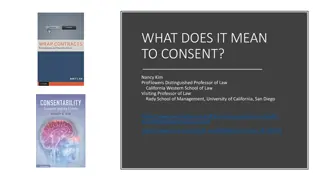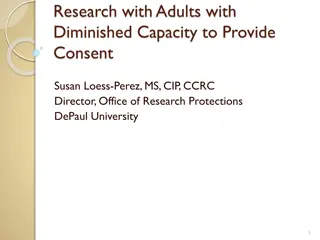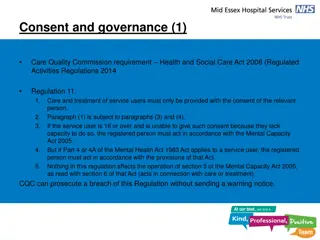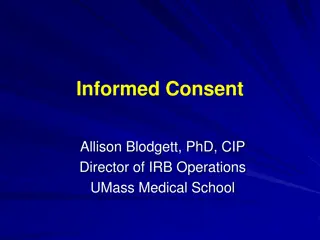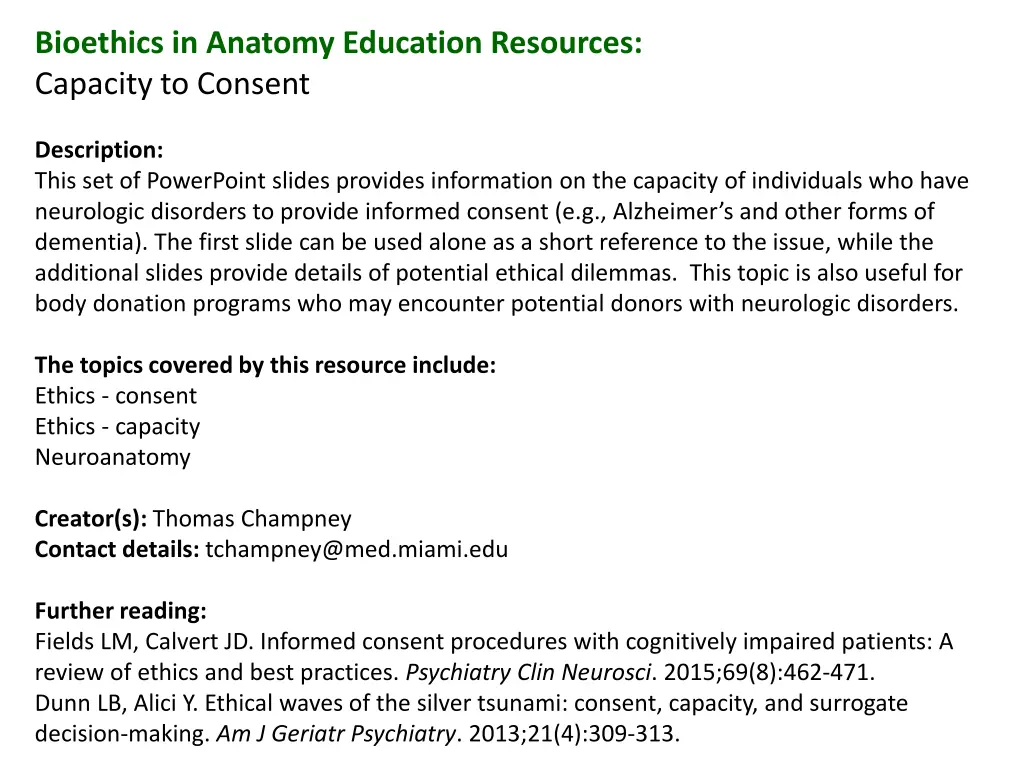
Understanding Capacity to Consent in Neurologic Disorders
Explore the ethical considerations regarding the capacity of individuals with neurologic disorders to provide informed consent, including details on ethical dilemmas, legal principles, and decision-making processes. Learn about the Mental Capacity Act, key principles for determining capacity, and questions surrounding consent in various scenarios.
Download Presentation

Please find below an Image/Link to download the presentation.
The content on the website is provided AS IS for your information and personal use only. It may not be sold, licensed, or shared on other websites without obtaining consent from the author. If you encounter any issues during the download, it is possible that the publisher has removed the file from their server.
You are allowed to download the files provided on this website for personal or commercial use, subject to the condition that they are used lawfully. All files are the property of their respective owners.
The content on the website is provided AS IS for your information and personal use only. It may not be sold, licensed, or shared on other websites without obtaining consent from the author.
E N D
Presentation Transcript
Bioethics in Anatomy Education Resources: Capacity to Consent Description: This set of PowerPoint slides provides information on the capacity of individuals who have neurologic disorders to provide informed consent (e.g., Alzheimer s and other forms of dementia). The first slide can be used alone as a short reference to the issue, while the additional slides provide details of potential ethical dilemmas. This topic is also useful for body donation programs who may encounter potential donors with neurologic disorders. The topics covered by this resource include: Ethics - consent Ethics - capacity Neuroanatomy Creator(s): Thomas Champney Contact details: tchampney@med.miami.edu Further reading: Fields LM, Calvert JD. Informed consent procedures with cognitively impaired patients: A review of ethics and best practices. Psychiatry Clin Neurosci. 2015;69(8):462-471. Dunn LB, Alici Y. Ethical waves of the silver tsunami: consent, capacity, and surrogate decision-making. Am J Geriatr Psychiatry. 2013;21(4):309-313.
Capacity to Consent The individuals to consent to treatments or to participate in research is fraught with ethical concerns. To determine if someone has the mental ability to make informed decisions, there are specific neurologic tests that can be used to determine mental capacity. This is the medical term associated with the determination of unimpaired informed decision making. ability of cognitively compromised Mental competence is the legal term for the ability of an individual to make informed decisions and should generally not be used by health care workers. https://www.mdedge.com/psychiatry/article/79219/practice- management/performing-capacity-evaluations-whats-expected-your https://www.ncbi.nlm.nih.gov/pmc/articles/PMC5109759/
Capacity to Consent The British government passed the Mental Capacity Act (2005) which outlines five key principles for determining capacity and what actions should be taken with those who lack capacity. Principle 1:Capacity should always be assumed. A patient s diagnosis, behavior, or appearance should not lead you to presume capacity is absent. Principle 2:A person s ability to make decisions must be optimized before concluding that capacity is absent. All practical steps must be taken, such as giving sufficient time for assessments; repeating assessments if capacity is fluctuating; and, if relevant, using interpreters, sign language, or pictures. Principle 3: Patients are entitled to make unwise decisions. It is not the decision but the process by which it is reached that determines if capacity is absent. Principle 4: Decisions (and actions) made for people lacking capacity must be in their best interests. Principle 5:Such decisions must also be the least restrictive option(s) for their basic rights and freedoms. https://www.ncbi.nlm.nih.gov/pmc/articles/PMC2234564/ https://www.youtube.com/watch?v=tsthYJV0yig
Capacity to Consent Questions to consider: Who determines capacity the patient, the family, the physician or the courts? What if an elderly patient refuses medical treatment, does that mean the patient does not have mental capacity? If a patient is unconscious, do they lose their mental capacity? If a patient is in a coma, do they lose their mental capacity? If an individual is determined to not have mental capacity, who makes the health care decisions for that individual? If an individual has a life-threatening disease and wants to use medically-assisted death (physician-assisted suicide), does this require mental capacity? Should this individual be able to donate their organs or body after death? Pinterest.com







